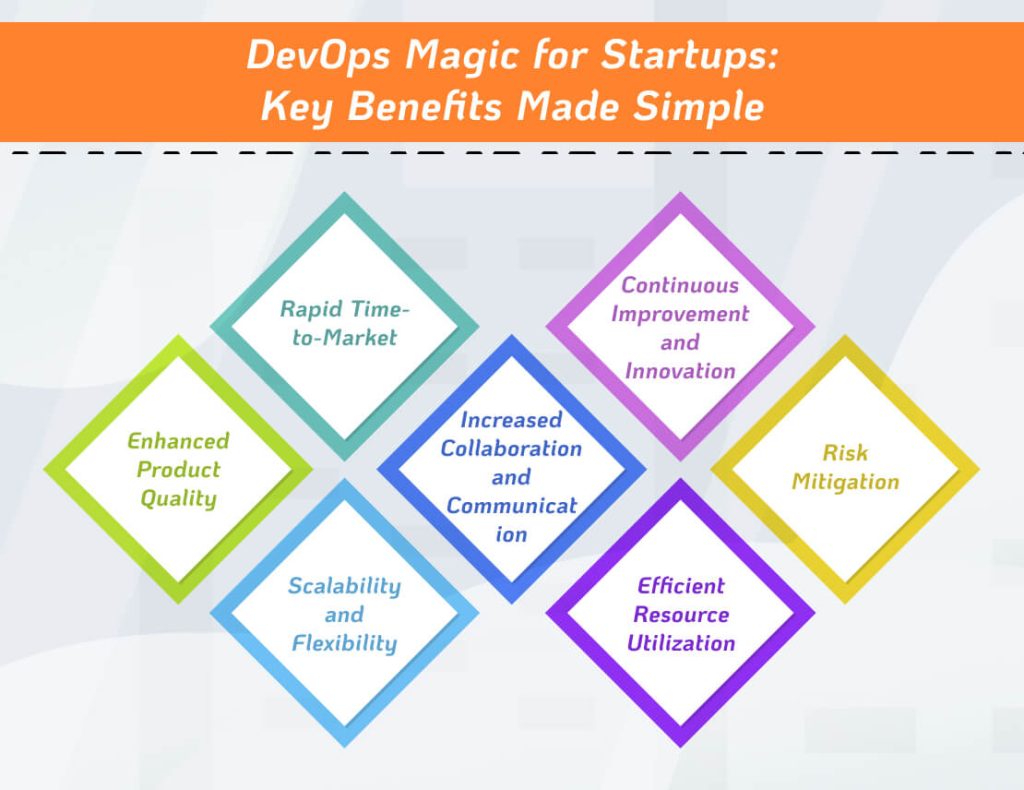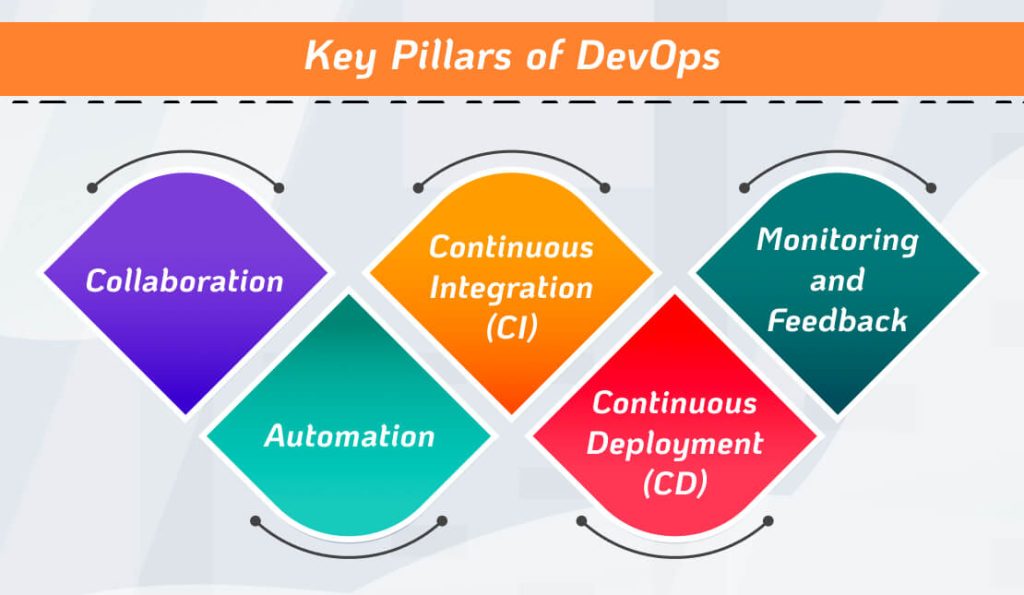Picture a transformative odyssey for your startup, where collaboration seamlessly weaves through, ideas effortlessly manifest, and your product becomes a market sensation. With DevOps as the cornerstone of your operational framework, this vision transforms into reality.
At AddWeb Solution, a leading provider of DevOps professional services and revolutionary IT solutions, we empathize with the challenges startups face on their path to triumph. This blog is thoughtfully crafted to provide you with insights and strategies, empowering you to streamline your development processes.
Diving into the realm of DevOps for startups, this blog will unravel best practices and share real-life examples to catalyze your growth trajectory. Brace yourself to witness firsthand how the fusion of DevOps and cutting-edge technologies can unleash the latent potential of your startup.
Are you ready to propel your startup to unparalleled heights? Join us on this exciting journey as we unravel the intricacies of DevOps consulting company for startups. Together, let’s unlock the gateway to your growth potential and forge a future where innovation and success know no boundaries.
Discovering Success: How DevOps Transforms Startups
Are you a startup ready to revolutionize the market and achieve rapid growth? In a world of fierce competition, embracing innovative approaches is a must to stay ahead. Here’s where DevOps steps in, reshaping the way startups develop, deploy, and scale their products with remarkable speed and precision.
DevOps Magic for Startups: Key Benefits Made Simple

Rapid Time-to-Market:
Speed is the name of the game in startups. DevOps automates tasks, streamlines processes, and ensures faster releases. Through Continuous Integration and Continuous Delivery (CI/CD), startups can iterate, test, and deploy products swiftly.
Enhanced Product Quality:
Quality is a startup’s secret weapon. DevOps puts a spotlight on automated testing, ensuring thorough code testing throughout development. Early bug identification leads to higher product quality, increased customer satisfaction, and a stellar brand reputation.
Scalability and Flexibility:
Startups grow fast, and DevOps has their back. Practices like Infrastructure as Code (IaC) enable seamless scalability. Tools like Terraform and Ansible let startups adapt infrastructure to changing demands, handle increased traffic, and ensure a smooth user experience.
Increased Collaboration and Communication:
DevOps breaks down silos, fostering cross-functional collaboration. Tools like Slack and Jira enhance communication, ensuring everyone is on the same page. Shared responsibility and effective communication align teams, break barriers, and boost efficiency.
Continuous Improvement and Innovation:
DevOps nurtures a culture of continuous improvement. By embracing Agile principles, startups experiment, learn from failures, and adapt quickly. This keeps startups ahead, delivering value and identifying growth opportunities.
Efficient Resource Utilization:
Startups maximize efficiency with cloud services like AWS, Azure, or Google Cloud. These cost-effective solutions enable startups to pay for resources as needed, avoiding hefty upfront investments.
Risk Mitigation:
DevOps practices tackle risk management through security, monitoring, and automated rollback mechanisms. Proactive monitoring, anomaly detection, and computerized rollbacks minimize downtime and customer impact in case of deployment failures.
Understanding DevOps: A Holistic Overview
DevOps is more than a mere amalgamation of development and operations; it’s a culture, a set of practices, and a philosophy that reshapes how software is conceived, developed, tested, and deployed. At its core, DevOps seeks to enhance collaboration, automate processes, and expedite the delivery of robust software solutions.
Key Pillars of DevOps

1. Collaboration:
Bridging the historical gap between development and operations teams fosters a culture of collaboration, shared goals, and collective responsibility.
2. Automation:
Automation forms the backbone of DevOps, minimizing manual intervention, reducing errors, and accelerating the pace of software delivery.
3. Continuous Integration (CI):
Frequent integration of code changes ensures early bug detection and facilitates a more cohesive and stable codebase.
4. Continuous Deployment (CD):
Extending CI and CD automates the deployment process, enabling a continuous flow of updates to production environments.
5. Monitoring and Feedback:
Real-time monitoring provides actionable insights into application performance, allowing for swift issue identification and resolution.
DevOps for Startups: The Blueprint for Scaling Success
1. Agility:
In the volatile startup ecosystem, agility is not just an advantage; it’s a survival imperative. DevOps consulting companies seamlessly align with agile methodologies, ensuring rapid responses to market dynamics.
2. Speed:
Speed is the essence of startup growth. DevOps methodologies empower startups to release features at an unprecedented pace, gather real-time user feedback, and iterate rapidly.
3. Efficiency:
The marriage of automation and streamlined processes enhances operational efficiency, enabling startups to achieve more with limited resources.
4. Scalability:
DevOps practices are inherently scalable, providing startups with the framework to seamlessly expand their infrastructure, deployment pipelines, and development teams.
5. Reliability:
Emphasizing automation and continuous testing contributes to the reliability of software systems, a critical factor in maintaining user trust.
Implementing DevOps in the Startup Landscape
1. Holistic Assessment:
Commence the DevOps journey with a meticulous assessment of existing processes, identifying areas for improvement, and pinpointing opportunities for automation.
2. Cultural Transformation:
Foster a DevOps culture by promoting collaboration, shared responsibilities, and a mindset of continuous improvement.
3. Toolchain Selection:
Choose DevOps tools for CI/CD, automation, and monitoring based on the startup’s specific needs and technological landscape.
4. Incremental Adoption:
Hire dedicated DevOps experts practices are best introduced incrementally, allowing teams to adapt gradually and learn iteratively from each phase.
5. Training and Upskilling:
Invest in training and upskilling team members to ensure proficiency in adopted DevOps practices and tools.
Challenges on the DevOps Horizon and Their Solutions
1. Cultural Resistance:
Overcoming resistance to cultural changes demands effective communication, leadership buy-in, and showcasing tangible benefits.
2. Tool Integration Challenges:
Seamlessly integrating various DevOps tools requires careful planning and the adoption of compatible technologies.
3. Security Concerns:
Addressing security concerns necessitates implementing security measures throughout the development pipeline, a concept known as DevSecOps.
Examples of DevOps implementations in startups
1. Netflix:
Explore Netflix’s evolutionary journey towards a fully-fledged DevOps culture, instrumental in its ability to deliver content globally with minimal downtime.
2. Etsy:
Delve into Etsy’s successful adoption of DevOps practices, which facilitated rapid feature releases, improved site reliability, and enhanced the overall customer experience.
Future Trends: Anticipating the Next Wave of DevOps for Startups
1. AI and Machine Learning Integration:
Witness the convergence of DevOps and AI/ML, poised to enhance predictive analytics and automate decision-making throughout the development lifecycle.
2. Serverless Architecture Adoption
Explore the rising trend of serverless architectures, offering startups the ability to focus on code development without the intricacies of managing the underlying infrastructure.
Conclusion
In conclusion, DevOps emerges not just as a methodology but as a strategic imperative for startups aiming to scale with unprecedented speed and efficiency. By fostering a culture of collaboration, automation, and continuous improvement, startups can navigate the challenges of scaling while maintaining the agility needed in today’s competitive landscape. This comprehensive guide serves as a compass for startups embarking on their DevOps journey, offering insights, strategies, and real-world examples to inspire and guide them toward sustained growth, innovation, and a competitive edge in the ever-evolving market.
FAQS
DevOps stands for Development and Operations, a collaborative approach to software development. For startups, it’s a game-changer, streamlining processes and fostering a culture of continuous improvement.
DevOps automates tasks, adopts CI/CD pipelines, and speeds up product iterations. This means quicker releases, allowing startups to bring their products to market faster.
Absolutely. DevOps emphasizes automated testing, catching bugs early, and ensuring top-notch product quality. This, in turn, boosts customer satisfaction and builds a strong brand image.
Startups often face rapid growth, and DevOps, through Infrastructure as Code (IaC) tools like Terraform and Ansible, enables seamless scalability. This is vital for handling increased user traffic and ensuring a smooth user experience.
DevOps breaks down silos, promoting cross-functional collaboration. Tools like Slack and Jira enhance communication, ensuring everyone is aligned and working towards shared goals, ultimately boosting overall efficiency.
Yes, indeed. DevOps fosters a culture of continuous improvement. By embracing Agile principles, startups can adapt quickly to market demands, fostering innovation and staying ahead in the competitive landscape.
Cloud services like AWS, Azure, or Google Cloud, combined with DevOps, offer cost-effective infrastructure solutions. This allows startups to pay for resources only when needed, maximizing efficiency and minimizing upfront investments.
DevOps integrates security measures, monitoring, and automated rollback mechanisms. Proactive monitoring helps startups detect and respond swiftly to potential security threats. Automated rollback processes ensure quick recovery from deployment failures, minimizing downtime and customer impact.
By embracing DevOps, startups gain benefits such as faster time-to-market, improved product quality, efficient scalability, enhanced collaboration, continuous improvement, resource optimization, and effective risk mitigation. These advantages contribute to sustainable growth and long-term success.
Startups can begin by assessing their current processes, setting clear goals, and seeking guidance from experienced DevOps service providers like ValueCoders. Incremental implementation allows startups to experience benefits gradually, making adjustments as needed for a smooth transition.

